19 June 2021 10:00 Decolonising Perspectives
Freeing Rome’s Captive Provinces: A Reconsideration of Imperial Architecture
Amy Miranda (Aarhus University)
In ancient Roman studies, the city of Rome has been conceptualized as the centre of a vast empire, while other cities have been seen as peripheral and inferior with respect to the capital. The corresponding colonialist approach to provincial art comes directly out of a non-critical acceptance of the ancient rhetoric of the Roman Empire, which first established this asymmetry. Such Romano-centric views in provincial studies are in need of a new perspective to free the provinces from the limits of this closed model. In this paper, I consider the so-called captives façade in Corinth, Greece (in the ancient province Achaea), and its bound personifications of the provinces – a motif deployed across the empire. To decolonize such a charged space, I deploy a framework that I call “relational spaces”, which draws upon the work of Henri Lefebvre, Edward Soja, and Dennis Cosgrove. These spatial theories have reaffirmed and expanded the possibilities of spatial experience in architectural studies, giving voice to underrepresented places and communities. When understood as more than an empirical physical entity, space provides a productive framework for investigating the variegated weave of Roman culture on display across the empire, particularly its architecture. An interrogation of the cityscape of Corinth during the Antonine principate – particularly the captives’ façade – allows me to stress the significant role of the body in creating and shaping manifold spaces, not solely the space of those in power. Ephemeral elements such as sunlight, conceptual elements such as history, or psychological elements such as knowledge, build spaces that have a greater impact upon shaping reception of and associations with works of architecture, and consequently the shaping of multiple spatialities. By approaching Corinth and the empire as a network of spatialities, the paper investigates which qualities – physical, ephemeral, conceptual, or psychological – have the potential to shape and decolonize spaces.
Amy Miranda is an art historian of the ancient Mediterranean world with a particular focus on the art and architecture of the Roman provinces in the Imperial period. She received her PhD from Johns Hopkins University (Baltimore, Maryland, USA) in 2020. Amy is currently at the Centre for Urban Network Evolutions, Aarhus University, where she is the postdoctoral fellow on the project, “Archive Archaeology: Preserving And Sharing Palmyra’s Cultural Heritage through Harald Ingholt’s Digital Archives”.
